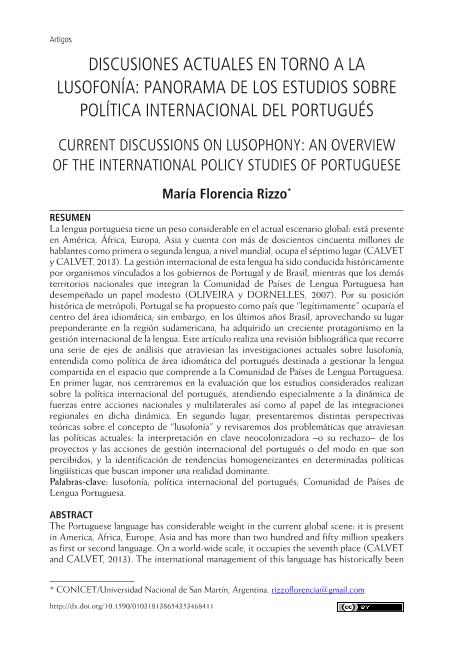Artículo
La lengua portuguesa tiene un peso considerable en el actual escenario global: está presente en América, África, Europa, Asia y cuenta con más de doscientos cincuenta millones de hablantes como primera o segunda lengua; a nivel mundial, ocupa el séptimo lugar (CALVET y CALVET, 2013). La gestión internacional de esta lengua ha sido conducida históricamente por organismos vinculados a los gobiernos de Portugal y de Brasil, mientras que los demás territorios nacionales que integran la Comunidad de Países de Lengua Portuguesa han desempeñado un papel modesto (OLIVEIRA y DORNELLES, 2007). Por su posición histórica de metrópoli, Portugal se ha propuesto como país que ?legítimamente? ocuparía el centro del área idiomática; sin embargo, en los últimos años Brasil, aprovechando su lugar preponderante en la región sudamericana, ha adquirido un creciente protagonismo en la gestión internacional de la lengua. Este artículo realiza una revisión bibliográfica que recorre una serie de ejes de análisis que atraviesan las investigaciones actuales sobre lusofonía, entendida como política de área idiomática del portugués destinada a gestionar la lengua compartida en el espacio que comprende a la Comunidad de Países de Lengua Portuguesa. En primer lugar, nos centraremos en la evaluación que los estudios considerados realizan sobre la política internacional del portugués, atendiendo especialmente a la dinámica de fuerzas entre acciones nacionales y multilaterales así como al papel de las integraciones regionales en dicha dinámica. En segundo lugar, presentaremos distintas perspectivas teóricas sobre el concepto de ?lusofonía? y revisaremos dos problemáticas que atraviesan las políticas actuales: la interpretación en clave neocolonizadora ?o su rechazo? de los proyectos y las acciones de gestión internacional del portugués o del modo en que son percibidos; y la identificación de tendencias homogeneizantes en determinadas políticas lingüísticas que buscan imponer una realidad dominante. The Portuguese language has considerable weight in the current global scene: it is present in America, Africa, Europe, Asia and has more than two hundred and fifty million speakers as first or second language. On a world-wide scale, it occupies the seventh place (CALVET and CALVET, 2013). The international management of this language has historically been conducted by organizations linked to the governments of Portugal and Brazil, while the other national territories that make up the Community of Portuguese Language Countries have played a modest role (OLIVEIRA and DORNELLES, 2007). Due to its historical position as a metropolis, Portugal has proposed itself as a country that would "legitimately" occupy the center of the idiomatic area. However, in recent years Brazil, taking advantage of its preponderant place in the South American region, has acquired a growing role in the international management of language. This article carries out a bibliographical review that runs through a series of themes of analysis that straddle current research on Lusophony, understood as a language policy of Portuguese aimed at managing the language shared in the space that includes the Community of Portuguese Language Countries. Firstly, we will focus on the evaluation that the considered studies make on the international policies of Portuguese, paying particular attention to the dynamics of forces between national and multilateral actions as well as the role of regional integrations in the aforementioned dynamics. Secondly, we will present different theoretical perspectives on the concept of "Lusophony" and we will review two problems that current policies go through: the interpretation from a (neo)colonizing perspective -or its rejection- of projects and international management actions of the Portuguese or the way they are perceived; and the identification of homogenizing tendencies in certain language policies that seek to impose a dominant reality.
Discusiones actuales en torno a la lusofonía: panorama de los estudios sobre política internacional del portugués
Título:
Current discussions on lusophony: an overview of the international policy studies of portuguese
Fecha de publicación:
04/2019
Editorial:
Universidade Estadual de Campinas. Instituto de Estudos da Linguagem
Revista:
Trabalhos em Linguística Aplicada
ISSN:
0103-1813
Idioma:
Español
Tipo de recurso:
Artículo publicado
Clasificación temática:
Resumen
Archivos asociados
Licencia
Identificadores
Colecciones
Articulos(SEDE CENTRAL)
Articulos de SEDE CENTRAL
Articulos de SEDE CENTRAL
Citación
Rizzo, María Florencia; Discusiones actuales en torno a la lusofonía: panorama de los estudios sobre política internacional del portugués; Universidade Estadual de Campinas. Instituto de Estudos da Linguagem; Trabalhos em Linguística Aplicada; 1; 58; 4-2019; 287-312
Compartir
Altmétricas




